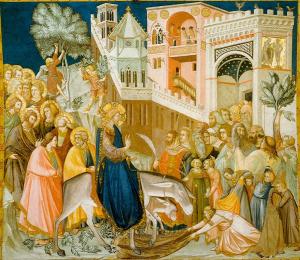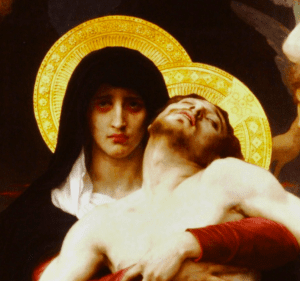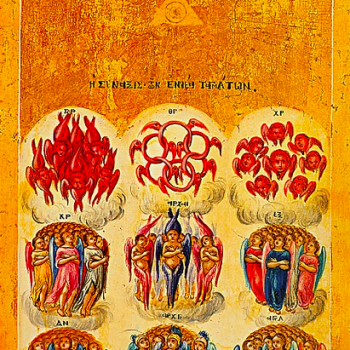Note: the passage I chose for Good Friday this year is from Flannery O’Connor’s novel The Violent Bear It Away, and spoils one of its vital plot points. I can hardly recommend the novel in question highly enough, so if you (1) haven’t read it yet, (2) are at all likely to, and (3) don’t like spoilers, definitely skip the Good Friday passage!
Palm Sunday

O Thomas, return, Archbishop; return, return to France.
Return. Quickly. Quietly. Leave us to perish in quiet.
You come with applause, you come with rejoicing, but you come bringing death in Canterbury:
A doom on the house, a doom on yourself, a doom on the world.—T. S. Eliot, Murder In the Cathedral
Fig Monday
There is a difference between saying: “If you hold your finger in the fire you will get burned” and saying, “If you whistle at your work I shall beat you, because the noise gets on my nerves.” The God of the Christians is too often looked upon as an old gentleman of irritable nerves who beats people for whistling. This is the result of a confusion between arbitrary “law” and the “laws” which are statements of fact. … Scattered about the New Testament are other statements concerning the moral law, many of which bear a similar air of being arbitrary, harsh, or paradoxical: “Whosoever will save his life shall lose it”; “to him that hath shall be given, but from him that hath not shall be taken away even that which he hath”; “it must needs be that offenses come, but woe unto that man by whom the offense cometh” …
We may hear a saying such as these a thousand times, and find in it nothing but mystification and unreason; the thousand-and-first time, it falls into our recollection pat upon some vital experience, and we suddenly know it to be a statement of inexorable fact. … The cursing of the barren fig-tree looks like an outburst of irrational bad temper, “for it was not yet the time of figs”; till some desperate crisis confronts us with the challenge of that acted parable and we know that we must perform impossibilities or perish.
—Dorothy L. Sayers, The Mind of the Maker
Temple Tuesday
This ordered life is not for everyone.
Never, to their surprise, for those who run
Away from love. Does not his coffee taste
Bitter? Ah, but how bitter is the waste
Of effort if why we give does not last.You see, we are not playroom monks. Our hearts
Are in this, or we go. If not, the starts
And stops tell all the others what we ought
To do, and they persuade us. Had you thought
We stayed because we liked the quiet at night?No, but you wonder what it is we do.
Simply, we love, and that is always new.
At Mass each morning we behold the Man,
The God, who died for us. Our prayer times can
Not last long enough to thank him in.—Dunstan Thompson, The Halfway House

Spy Wednesday
There had been a continuous stream of penitents from eight to ten—two hours of the worst evil a small place like this could produce after three years. It hadn’t amounted to very much—a city would have made a better show—or would it? There isn’t much a man can do. …
He interrupted the woman savagely, “Why don’t you confess properly to me? I’m not interested in your fish supply or in how sleepy you are at night … remember your real sins.”
“But I’m a good woman, father,” she squeaked at him with astonishment.
“Then what are you doing here, keeping away the bad people?” He said, “Have you any love for anyone but yourself?”
“I love God, father,” she said haughtily. He took a quick look at her in the light of the candle burning on the floor—the hard old raisin eyes under the black shawl—another of the pious—like himself.
“How do you know? Loving God isn’t any different from loving a man—or a child. It’s wanting to be with Him, to be near Him.” He made a hopeless gesture with his hands. “It’s wanting to protect Him from yourself.”
—Graham Greene, The Power and the Glory
Maundy Thursday
I taught her, as men teach a parrot, to say, “Lies of poets,” and, “Ungit’s a false image.” I made her think that ended the question. I never said, Too true an image of the demon within. … She never asked me (I was content she shouldn’t ask) why the people got something from the shapeless stone which no one ever got from that painted doll of Arnom’s. Of course, I didn’t know; but I never told her I didn’t know. I don’t know now. Only that the way to the true gods is more like the house of Ungit … oh, it’s unlike too, more unlike than we yet dream, but that’s the easy knowledge, the first lesson; only a fool would stay there, posturing and repeating it. The Priest knew at least that there must be sacrifices. They will have sacrifice—will have man. Yes, and the very heart, center, ground, roots of a man; dark and strong and costly as blood.
—C. S. Lewis, Till We Have Faces
Good Friday
“Wake up, buddy,” the driver said. “I say how come your pantslegs are wet?”
“Because I never took them off when I done it,” he said. “I took off my shoes but I never taken off my pants.”
“When you done what?”
“I’m going home,” he said. “It’s a place I get off at on 56 and then down that road a piece I take a dirt road. It’s liable to be morning before I get there.”
“How come your pantslegs are wet?” the driver persisted.
“I drowned a boy,” Tarwater said.
“Just one?” the driver asked.
“Yes.” He reached over and caught hold of the sleeve of the man’s shirt. His lips worked a few seconds. They stopped and then started again as if the force of a thought were behind them but no words. He shut his mouth, then tried again but no sound came. Then all at once the sentence rushed out and was gone. “I baptized him.”
“Huh?”
“It was an accident. I didn’t mean to,” he said breathlessly. Then in a calmer voice he said, “The words just come out of themselves but it don’t mean nothing. You can’t be born again.”—Flannery O’Connor, The Violent Bear It Away
Holy Saturday

But, Madam, you who willingly sacrific’d yourselfe to God, in yr obedience to him, in yr own sicknes, cannot be doubted to dispute wt him, about any part of you, wch he shall be pleas’d to requier at yr hands. The difference ys great, in the losse of an arme, or a Head; of a child, or a Husband: But to them, who are incorporated into Christ, theyr Head, there can be no beheadinge; upon you, who are a Member of the spouse of Christ, the Churche, there can fall no wydowhood, nor Oprhanage upon those children, to whom God ys father.
—John Donne, To the Honorable Lady Kingsmel: Upon the Death of Her Husband
Easter Sunday
A few wise masters devised for the heart
a road from the universe into dematerialized spirit,
but most prattled cunning preventive doctrine;
till on a day from a hill in the middle of Athens
where men adored Irony the unknown lord,
Paul sent over Athens and Rome his call:
“Whom ye ignorantly worship, him I declare.”The crooked smiles of the Greeks
fled from their faces while thorned-in-the-flesh the Apostle
against their defensive inflections of verb and voice,
their accents of presaged frustration, their sterile protections,
named in its twyfold Nature the golden Ambiguity.
Then for the creature he invented the vocabulary of faith;
he defined in speech the physiological glory
and began to teach the terms of the work of glory.
The young Church breakfasted on glory; handfasted,
her elect functioned in the light.—Charles Williams, “Prelude,” The Region of the Summer Stars












